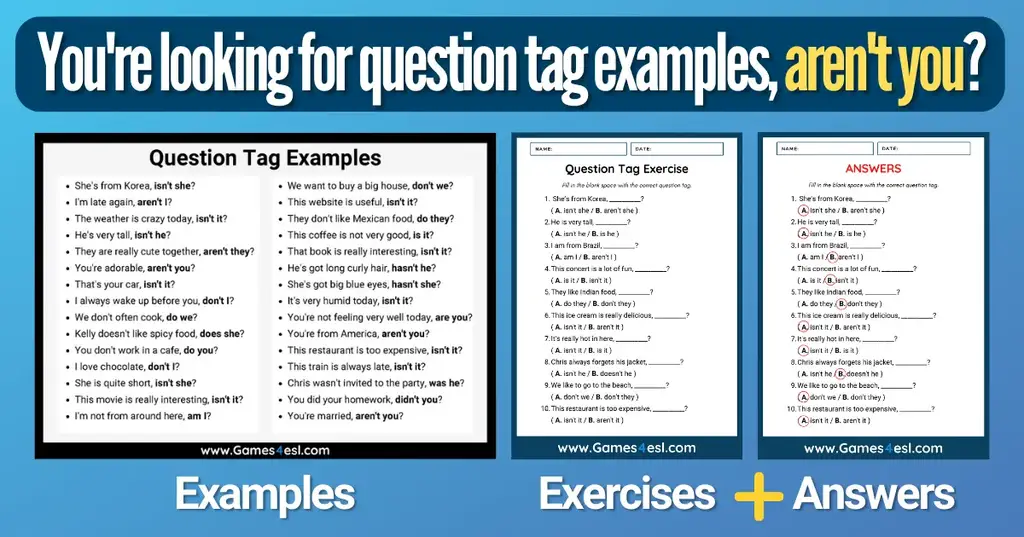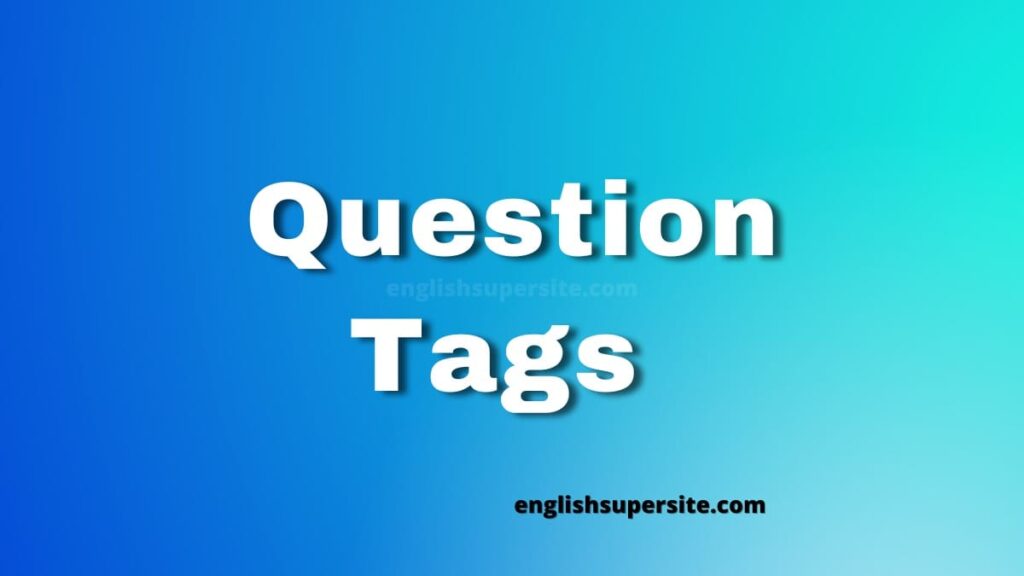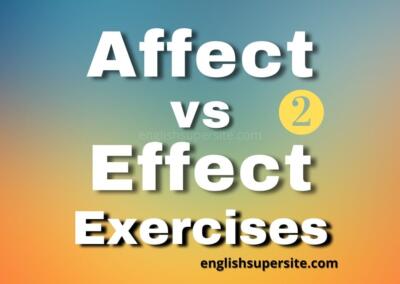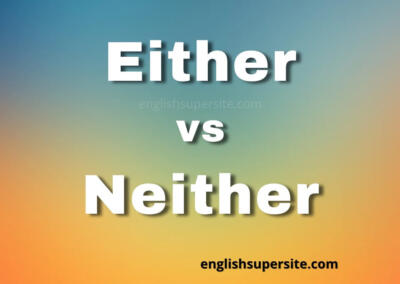- 700k Followers
- 990k Followers
- +91 7065060158

- By Krishnatrya Krishnatrya
- April 29, 2024

Understanding Question Tags in English Grammar: A Beginner's Guide
/ Grammar Lessons / A1-A2 Grammar / Understanding Question Tags in English Grammar: A Beginner's Guide

What are Question Tags?
Question tags are short questions added at the end of a statement. They are used to confirm information, seek clarification, express surprise, or show interest in what someone has said. Question tags typically consist of an auxiliary verb and a pronoun that matches the subject of the statement.
Forming Question Tags:
Positive Statement + Negative Question Tag:
- Example: "It's a beautiful day, isn't it?"
- Here, the positive statement "It's a beautiful day" is followed by the negative question tag "isn't it?"
Negative Statement + Positive Question Tag:
- Example: "You're not coming, are you?"
- In this case, the negative statement "You're not coming" is followed by the positive question tag "are you?"
Usage Examples:
Confirming Information:
- Statement: "She is your sister, isn't she?"
- Statement: "You've finished your homework, haven't you?"
Seeking Clarification:
- Statement: "We need to leave soon, don't we?"
- Statement: "He doesn't like chocolate, does he?"
Expressing Surprise or Interest:
- Statement: "You're going on vacation, are you?"
- Statement: "It's your birthday tomorrow, isn't it?"
Additional Points to Remember:
- Matching Pronouns: Ensure that the pronoun in the question tag matches the subject of the statement.
- Using Auxiliary Verbs: Use appropriate auxiliary verbs such as "is," "are," "do," "does," "did," "have," etc., depending on the tense and form of the statement.
- Intonation: Pay attention to the intonation when using question tags. Rising intonation indicates a question while falling intonation indicates a statement.
Practice Exercises:
Now, let's practice forming question tags with the following statements:
- Statement: "She likes coffee, ___?"
- Statement: "They haven't seen the movie, ___?"
- Statement: "He can swim, ___?"
- Statement: "It's raining outside, ___?"
- Statement: "You didn't finish your homework, ___?"

Conclusion:
Question tags are an essential part of English grammar, allowing speakers to engage in interactive and meaningful conversations. By mastering the use of question tags, you can enhance your communication skills and better connect with others.
Try this exercise to test your grammar.
Total score is 2 out of 0 ( 25% )
A1-A2 Grammar : Understanding Question Tags in English Grammar: A Beginner's Guide
Choose the correct word.
Language Level
Average: (0 votes)
Do you need to improve your English grammar?
Join thousands of learners from around the world who are improving their English grammar with our online courses.
There are no comments yet.
Log in or register to post comments
Copyright © 2024 ESOL SOLUTION PRIVATE LIMITED. All Rights Reserved
- Staff Portal
Stack Exchange Network
Stack Exchange network consists of 183 Q&A communities including Stack Overflow , the largest, most trusted online community for developers to learn, share their knowledge, and build their careers.
Q&A for work
Connect and share knowledge within a single location that is structured and easy to search.
How to reply to question tags
English is not my native-tongue, so I always find it hard to grasp the concept of "question tags" and more importantly the way to answer to them. Let me explain with the help of this situation -
I am supposed to complete my homework and I haven't. My mom suspects that I haven't and asks me the below question. I want to confess that I haven't. What should I answer?
Mom : You didn't finish your homework, did you?
Me : Yes, I haven't [OR] No, I haven't?
I've always thought that it is "Yes, I haven't" because the questioner has already found out that I haven't and I should just assert it by saying 'Yes'. But a friend of mine says that it is "No, I haven't" because I am effectively answering the question "did you?".
Which of us is correct?
- question-tags
- 6 You could just do your homework and avoid the issue all together. – Sam Commented Apr 1, 2011 at 13:36
- 3 Now I am earwormed with "Yes, We Have No Bananas" – Kate Gregory Commented Apr 1, 2011 at 13:49
- Don't feel too bad about the confusion here. Native speakers get themselves into all sorts of trouble with these sorts of questions and answers. The answer you do want to avoid is simply saying "yes" or "no." Clarifying with "No, I haven't" helps a great deal. Even if you pick incorrectly, it will be a flag for the other person that something may be off. – MrHen Commented Apr 1, 2011 at 15:21
- 1 I just want to point out another grammatical error in this question. English speakers rarely switch auxiliary verbs when answering a question, so "You didn't finish ..." should be answered with "No, I didn't" and "You haven't finished ..." would be answered with "No, I haven't". This mistake is corrected without even being mentioned in most of the answers. – Peter Shor Commented Apr 2, 2011 at 12:13
- @Peter Shor : Oh! I didn't notice that! It's my fault. A typo. I understand that native speakers don't switch auxillaries. What I intended to add was "Me : Yes, I didn't [OR] No, I didn't?" – MediumOne Commented Apr 3, 2011 at 8:26
3 Answers 3
When someone asks a question by stating a negative fact, it would seem logical to answer affirmatively because the fact is true. However, it is more common to answer negatively to confirm the negativity.
Mom : You didn't finish your homework, did you? You : No, I didn't Mom : You finished your homework, didn't you? You : No, I didn't
In both cases the Mom wants to know about the status of the homework and the questions are equivalent to
Mom : Did you finish your homework?
(The reason to use the tag form is to communicate the speaker's assumptions or surprise or expectations about the homework rather than just asking for a status update).
There is more explanation about this here .
- The question is a classic ESL problem. Most language answer either '(positive response word)' to signal that the implied answer is correct , or '(negative response word)' when it's incorrect. English expects an answer of the form 'Yes, it is' or 'No, it isn't', the first word matching the following phrase in negativity rather than telling you you are correct or not. English sounds illogical here if you leave off the following phrase. But in English you don't leave it off. – Mitch Commented Apr 1, 2011 at 14:52
- I take it that "No, I didn't" is the correct usage. Nevertheless, I hope you all understood the crux of my problem. For the question "You didn't finish your homework, did you?", I try to reply, by habit, to the former part (You didn't finish your homework) rather than the question tag by saying "Yes, I didn't". To put it in another way, I consider the questions "You didn't finish your homework, did you?" and "You didn't finish your homework, right?" the same and reply with "Yes, I didn't". – MediumOne Commented Apr 1, 2011 at 16:42
- @MediumOne: That's right, "No, I didn't" is the correct way to answer the question. It does seem illogical. As @Mitch says the key is to include the "did/didn't" in the answer and match the positive/negative yes/no to that. Though in practice native speakers will often leave off the last part of the sentence because it is implied. This gives the confusing "You didn't finish your homework, did you?" "No." exchange. A native speaker will understand the implied "I didn't". – Mr. Shiny and New 安宇 Commented Apr 1, 2011 at 19:07
I personally think you should reply "No I didn't", because you didn't finish your homework.
You should not base your answer on the question tag itself, but rather on the actual answer to (in this case) "Did you finish your homework?"...
Look, I got a nice example from a site . Both these question tags are negative, but still the answer changes:
- The earth is bigger than the moon, isn't it? Yes, it is.
- The earth is bigger than the sun, isn't it? No , it isn't !
EDIT (@MediumOne in the comments): That doesn't really matter and I'll tell you why: when I reply to a question with a question tag, I don't really mind the question tag itself. I'm not a native speaker so I don't know how native speakers behave. But I think the way is to look at the question, is it negative or positive? Let's try, for example, with a "negative" question: " You didn't go to the Mall, did you? ". If you say " No I didn't ", you are CONFIRMING the question (you didn't go to the Mall), on the contrary, if you say "yes, I did", you are DENYING the question (you did go to the Mall).
The same goes for a "positive question" but on the opposite. EX: " You did go to the Mall, didn't you? ". If you say " No I didn't ", in this case, you are not confirming like before, but denying, and so if you say "Yes I did" you are confirming.
Summary : If the question (not question tag, just the actual question) is negative, a "no" confirms, if the question is positive, "yes" confirms. (If some native speaker can say something about this, it would be nice.)
- 1 Exactly. In this, English is different from a number of languages. We also lack a word like French "si" and German "doch", which means "Yes, contrary to what you have just suggested or asked". – Colin Fine Commented Apr 1, 2011 at 13:37
- You should not base your answer on the question tag itself, but rather on the actual answer to (in this case) "Did you finish your homework?"... If I were to reply to the former part of the question (You didn't finish your homework), then I would be answering "Yes". But from this post and the comments, I learned that I should be saying "No, I didn't". – MediumOne Commented Apr 1, 2011 at 16:43
- There is something inexplicably wrong with your example sentences. You have selected sentences which are always true or always false. In these cases, I am confident I won't make a mistake with the answer. It is those cases that can either be true or false that cause me problems. – MediumOne Commented Apr 2, 2011 at 6:09
- @MediumOne: My comment was getting too long, I'll edit my own answer, check above. – Alenanno Commented Apr 2, 2011 at 9:09
Question tags can be phrased ambiguously, but generally native speakers intuit the answer that gets them out of trouble.
You didn't finish your homework, did you?
The answer that gets you out of trouble here is "Yes, I did."
This can be confusing for non-natives. For example, in Japanese, the construction that would translate as "Aren't you going to the store?" would be answered with "Yes" (if you weren't going).
- 1 The OP is asking which answer would be correct in case he did not finish his homework... – RegDwigнt Commented Apr 1, 2011 at 13:26
- 1 I am a little confused by your answer. :) I don't want the answer that gets me out of trouble. I want to confess that I haven't done my homework. So, when I am asked "You didn't finish your homework, did you?", should I say " Yes , I haven't" or " No , I haven't"? My opinion is that "Yes, I haven't" is correct (like in the Japanese construction you mentioned). Am I right with my belief? – MediumOne Commented Apr 1, 2011 at 13:28
Not the answer you're looking for? Browse other questions tagged questions question-tags or ask your own question .
- Featured on Meta
- User activation: Learnings and opportunities
- Join Stack Overflow’s CEO and me for the first Stack IRL Community Event in...
Hot Network Questions
- Can anyone ID this bike? NSW, Australia
- Why does friendship seem transitive with befriended function templates?
- Why do "modern" languages not provide argv and exit code in main?
- How to respond to subtle racism in the lab?
- The quest for a Wiki-less Game
- Spacing between mathrel and mathord same as between mathrel and mathopen
- Why were there so many OSes that had the name "DOS" in them?
- Is Produce Flame a spell that the caster casts upon themself?
- A journal has published an AI-generated article under my name. What to do?
- Is this grammartically correct sentence "這藥物讓你每天都是良好的狀態"?
- Inspector tells me that the electrician should have removed green screw from the panel
- Remove spaces from the 3rd line onwards in a file on linux
- NSolve uses all CPU resources
- If Act A repeals another Act B, and Act A is repealed, what happens to the Act B?
- When does a finite group have finitely many indecomposable representations?
- How much could gravity increase before a military tank is crushed
- Word switching from plural to singular when it is many?
- What prevents indoor climbing gyms from making a v18 boulder even if one hasn't been found outside?
- Does hydrogen peroxide work as a rocket fuel oxidizer by itself?
- Assumptions of Linear Regression (homoscedasticity and normality of residuals)
- Is caching external calls considered a state change in the context of safe HTTP methods
- How does conservation of energy work with time dilation?
- Is this a misstatement of Euclid in Halmos' Naive Set Theory book?
- Rigorous definition of the matter power spectrum

Question Tag Examples And Exercises
Learning how to form question tags is not particularly difficult for English language learners. Rather, the challenge for students is using question tags naturally. For this reason, students need lots and lots of practice forming question tags. Below, you’ll find 30 question tag examples along with some question tag exercises so that you/your students will be able to use question tags fluently in no time.

Question Tag Examples
Question tag exercises, exercise 1: quiz, choose the correct question tag., exercise 2: pdf worksheet.
This next question tag exercise is a printable PDF worksheet. There are 10 questions and answers and each question asks you to fill in the blank with the appropriate question tag. This PDF also includes the answers on a separate page.

Home » Grammar » Question Tags
- Question Tags

Question Tags Rules, Forms, Exceptions, and Examples
Also known as Tag Questions , question tags are short questions added to the end of a sentence or statement. We use it to seek confirmation, clarification, agreement, or a response from the listener.
The question tag usually mirrors the verb in the statement.
- If the statement is positive , the tag is negative .
- If the statement is negative , the tag is positive .
Positive Statement + Negative Tag
- He is an engineer, isn’t he?
- She is a doctor, isn’t she?
- It is a beautiful day, isn’t it?
- They are coming to the party, aren’t they?
- You are my neighbor, aren’t you?
- She is Pamela’s mother, isn’t she?
- He is coming to the party, isn’t he?
- The bus stop is over here, isn’t it?
- He can swim, can’t he?
- You can play soccer, can’t you?
- We should leave now, shouldn’t we?
- They can help us, can’t they?
- They were impressed by the sale, weren’t they?
- They could hear me, couldn’t they?
Positive statements without the auxiliary verb, we use don’t, doesn’t or didn’t
- They arrived on time, didn’t they?
- He speaks English, doesn’t he?
- They like the new idea, don’t they?
- I said that already, didn’t I?
- He always gives a good impression, doesn’t he?
- Mark likes cheese, doesn’t he?
- This will work, won’t it?
Negative Statement + Positive Tag:
- He isn’t here, is he?
- Mary isn’t working on that, is she?
- Your father doesn’t like to have fun, does he?
- You haven’t been there, have you?
- You have finished your homework, haven’t you?
- We haven’t had so many people coming before, have we?
- He just can’t get this presentation right, can he?
- You didn’t see the movie, did you?
- I don’t have to finish it this week, do I?
- They won’t mind, will they?
- She won’t mind that, will she?
- He won’t forget, will he?
- This will not work, will it?
- You won’t mind if I borrow your pen, will you?
- This situation isn’t getting any better, is it?
- There is nothing wrong with it, is there?
Pay very close attention to the tense of the auxiliary verb in the phrase or statement when forming the question tag.
If there is no auxiliary verb , use “do” or “does” for the present simple and “did” for the past simple.
Imperative Sentences
For imperative sentences, the question tag is “will you?” or “won’t you?” :
- Open the window, will you?
- Close the door, will you?
- Take a sit, won’t you?
If we use I am in the statement:
Positive the tag is “am”
- I’m not being too personal, am I?
- I’m not the right person for the job, am I?
- I am never late, am I?
Negative the tag is “aren’t”
- I’m really smart, aren’t I?
- I’m on time, aren’t I?
- I’m intelligent, aren’t I?
Statements with Negative Adverbs
We have a negative sense when we use the adverbs rarely , hardly , seldom , and never . Therefore the question tag is usually positive:
- She rarely attends meeting on time, does she?
- We have never seen that movie, have we?
- You hardly ever forget your keys, do you?
Let’s (Let us)
When “let’s” is used, the question tag is “shall we?”
- Let’s go, shall we?
- Let’s dance, shall we?
- Let’s not talk about his subject, shall we?
Question tags can be used for a variety of purposes, such as seeking confirmation, emphasizing a point, or asking for a response. Understanding how they are formed and used improves communication and reassures grammatical accuracy.
Statements with Everything, Something and Nothing as a subject
We use “it” in the question tag
- Something happened to her, didn’t it?
- Nothing is wrong, is it?
Now test your knowledge with these exercises!
Study Also :
- IN – ON – AT
- Modal Verbs
- Adverbs of Frequency
- Phrasal Verbs
- Parts of Speech
- Verb Tenses
- Irregular Verbs
- Other, the other and Another
- Common Mistakes
- Confusing Words
Adjectives Adverbs Articles Career Comparative Conditionals Confusing Words Conjunctions Exercises Future Continuous Future Perfect Future Perfect Continuous Grammar Homonyms Interjections Irregular Verbs Journaling Learn English Linking Words Listening Exercises Mistakes Nouns Past Continuous Past Perfect Past Perfect Continuous Plural Prepositions Present Continuous Present Perfect Present Perfect Continuous Pronouns Question Tags Quiz Quotes Reading Simple Future Simple Past Simple Present Spelling Strategies Superlative Tests Verbs Verb Tenses Vocabulary
Share with your friends!
Related Post

Affect vs Effect – Exercises 2

- Future Perfect Continuous

Either vs Neither
- Adjective Order
- Borrow – Lend – Loan – Exercises
- Countable and Uncountable Nouns
- Comparative and Superlative Adjectives
- Capital Letters in English
- Conditionals
- Pronouns – Exercises 1
- DO vs MAKE – Exercises 2
- Past Perfect Continuous
- A1 (Beginner)
- A2 (Elementary)
- B1 (Intermediate)
- B2 (Upper-Intermediate)
- C1 (Advanced)
- C2 (Proficient)
- Abbreviations
- Conjunctions
- Prepositions
- Pronunciation
- Spelling and Formatting
Most Popular
- TO vs FOR – Exercises
- Fill up or Fill in or Fill out
- IN – ON – AT – Exercises
- TO vs FOR – Exercises 2
- Tell, Say and Speak
- If vs Whether
- DO vs MAKE – Exercises
- Common Mistakes 1
- Common Mistakes 2
- English Test 1
- A – AN – THE – Exercises
Pin It on Pinterest

Question Tags: How to Ask for Confirmation in English, plus Exercises
You know what questions tags are, don’t you? If you have never heard of this before, go back to the first sentence of this blog post. The clause don’t you? is what we call a question tag. There are positive tags and negative tags. Keep reading to understand the difference between them.
These types of question help us ask for confirmation. However, there are several rules you should know in order to use question tags correctly. They can be super helpful for any English learner, so keep reading this blog post for more information about them.
What are question tags?
Most questions start with a WH question word or a verb like do, doesn’t, is, are , etc. These are punctuated with a question mark (?).
However, some questions can be written like a normal sentence, with a little something extra added at the end. This is called a question tag. It is a short clause (a clause is a group of words) that we add to the end of a sentence with either one of these purposes:
- to confirm that something is true Example: They are married, aren’t they?
- to encourage the person we are having a conversation with to give us a reply Example: That is a brilliant idea, isn’t it?

A question tag is similar to asking something like Am I right? or Do you agree with me? after a sentence. It is important to mention that question tags are also called tag questions .
The structure of a question tag
In this section, you will learn how to form a question using a tag. Remember, the tag is always at the end of the sentence. The question in this form has two important parts: the sentence and the tag .
A question tag is special because the two parts are opposites. They are like magnets with a positive end and a negative end. If we have a positive sentence, we need a negative tag. However, if we have a negative sentence, we add a positive tag to it. Look at the examples below:
- She is your sister, isn’t she ?
Positive sentence: She is your sister Negative tag: isn’t she?
- Luke doesn’t have kids, does he ?
Negative sentence: Luke doesn’t have kids Positive tag: does he?

[convertkit form=2182327]
Positive tags
Now, let’s take a look at the rules for forming the positive tags. Remember: a negative sentence asks for a positive tag. Read more about the difference between simple past and present perfect here.
| To Be | He isn’t American, | is he? |
| Simple Present | Lucy doesn’t like to drive, | does she? |
| Simple Past | Kelly didn’t go to class, | did she? |
| Past Continuous | Paul wasn’t cooking dinner, | was he? |
| Present Perfect | You haven’t been to Canada, | have you? |
| Future (Will) | She will not come to the party, | will she? |
| Future (Going to) | Joanna isn’t going to the doctor tomorrow, | is she? |
| Modal Verbs | Julie can’t drive, | can she? |

Negative tags
Now, let’s take a look at the rules for forming the negative tags. Remember: a positive sentence asks for a negative tag.
| To Be | Sarah is tall, | isn’t she? |
| Simple Present | They like pizza, | don’t they? |
| Simple Past | They went to the party, | didn’t they? |
| Past Continuous | They were making pizza, | weren’t they? |
| Present Perfect | He has worked there for 5 years, | hasn’t he? |
| Future (Will) | We will go home, | won’t we? |
| Future (Going to) | They are going to Paris, | aren’t they? |
| Modal Verbs | He can speak English, | can’t he? |

Intonation
There are two possible kinds of intonation in question tags: the rising intonation and the falling one. We use the rising intonation when we are not sure about what we just said. It’s a way to ask for clarification. Meanwhile, the falling intonation is used when we are pretty sure about our statement and just want somebody else to confirm our thoughts.
Exceptions
Almost all question tag situations follow the rules from the tables above, but of course, there are a few exceptions! That’s the nature of English, isn’t it?
1. When we use the expression Let’s , the question tag is always shall we?
If the sentence part of your question tag starts with “Let’s” , you should use “shall we” as the tag.
Here are some examples:
- Let’s go to the party, shall we?
- Let’s get to work, shall we?
2. When a sentence starts with I am , the question tag must be aren’t I?
If you use the first-person singular in the present tense (read: I am ) for the sentence part of your question tag, you should use aren’t I as the tag. Take a look at this sentence:
- I am late, aren’t I?

3. Imperatives and question tags
An imperative is a sentence that starts with an action verb. They are used a lot for instructions. You might hear a teacher or a boss talk with imperatives.
Imperative examples:
- Bring that to me.
Whenever we have a sentence in the imperative, the tag needs to be will you / would you / or won’t you? You can choose which tag to use.
Here are three examples:
- Pass me the sugar, will you?
- Close the door, would you?
- Sit down, won’t you?
4. Negative words, such as nobody, never, no, and hardly , need positive tags
Negative words need positive tags. These are words like nobody, never, no, hardly, etc. Also, for words like nobody, everybody, and somebody , the question tag should be they . Take a look at some examples:
- Nobody wants to go home, do they?
- We have never been to your grandma’s house, have we?
[fusion_fusionslider name=”english-courses” full_height=”no” offset=”” hide_on_mobile=”small-visibility,medium-visibility,large-visibility” class=”” id=”” /]
Pratice time
Check your understanding with the exercises below. Have fun!
Exercise 1 – Drag the words
Exercise 2 – fill in the blanks.
We use question tags every day, don’t we? Being able to use them correctly is essential for any English learner. We hope this blog post is helpful to you. For more information, check out this video about question tags . Let’s study, shall we?

Download our 100% free app
Find everything you need to learn english.


Available space for your advertising
Question tags.

Asking questions
1. question tags.

2. Characteristics and uses of questions tags
- Question tags are formed taking into account the verb tense of the statement of reference.
- When the statement of reference is affirmative , the question tag is negative ; when the statement of reference is negative , the question tag is affirmative .
- They are placed at the end of the sentence, preceded by a comma and followed by a question mark.
- Question tags are formed by an auxiliary or modal verb , followed by a personal subject pronou n , according to the verb tense and the subject of the statement of reference.
Below, we detail different verb tenses with their corresponding question tags.
| Verb tense | Positive sentence | Negative sentence |
|---|---|---|
| To be present | Summer the best season, ? | We late, ? |
| Present simple | He skiing, ? | I need this, ? |
| Present continuous | They still sleeping, ? | She being serious, ? |
| To be past | Mary worried, | They at home, ? |
| Past simple | You yourself, ? | He get hurt, ? |
| Past continuous | Your parents painting, ? | It raining this morning, ? |
| Present perfect | You locked the door, ? | He written this essay, ? |
| Past perfect | You already been here, ? | We eaten snails before, ? |
| Future will | I do well, ? | They get angry, ? |
| Future Going to | You going to buy a flat, ? | She going to come, ? |
| Modals | I give up smoking, ? | She send the parcel, ? |
When the statement of reference is in present simple or past simple affirmative , no auxiliary verb is used. However, we must remember that in the question tag we will use don't/doesn't in the present and didn't in the past .
3. Special cases
We must take into account some special cases:
| Sentence | Question tag | Uso |
|---|---|---|
| Close the door, | won't you? | Polite |
| would you? | Very polite | |
| could you? | Neutral | |
| will you? | Neutral | |
| can you? | Informal |

4. Comments
| COMMENTS | Examples |
|---|---|
| In sentences with a positive verb but with a word with a negative meaning ( , , ...), the will be . | She agrees on anything, ? |
| If the subject of the sentence is or , the pronoun of the will be . If the subject is or , the pronoun will be . | That's you sister, |
| When the subject is , ..., the personal pronoun of the will be . If it's , ..., the pronoun will be . | Someone will fix that, ? |
| In sentences with , the will not take any personal pronoun, but will take the particle . | There aren't any pears, ? |
| Verb tense | Positive sentence | Negative sentence |
|---|---|---|
| You a doctor. | She is a doctor, ? | They aren't doctors, ? |
| He judo. | He does judo, ? | He doesn't do judo, ? |
| She in New York. | She is living in New York, ? | She isn't living New York, ? |
| It his birthday yesterday. | It was his birthday yesterday, ? | It wasn't his birthday yesterday, ? |
| They a new car last week. | They bought a new car last week, ? | They didn't buy a new car last week, ? |
| He at the bus stop. | He was waiting at the bus stop, ? | He wasn't waiting at the bus stop, ? |
| They here for seven years. | They have lived here for seven years, ? | They haven't lived here for seven years, ? |
| She him the gift. | She had given him the gift, ? | She hadn't given him the gift, ? |
| He here tomorrow. | He will be here tomorrow, ? | He won't be here tomorrow, ? |
| We a party. | We are going to have a party, ? | We aren't going to have a party, ? |
| I read this letter. I answer the letter | I can read this letter, ? I should answer the letter, ? | I can't read this letter, ? I shouldn't answer the letter, ? |
Tag Questions
Perfect english grammar.

Tag questions (or question tags) turn a statement into a question. They are often used for checking information that we think we know is true.
Tag questions are made using an auxiliary verb (for example: be or have ) and a subject pronoun (for example: I, you, she ). Negative question tags are usually contracted: It's warm today, isn't it (not 'is it not')
Usually if the main clause is positive , the question tag is negative , and if the main clause is negative , it's positive . For example: It's cold (positive), isn't it (negative)? And: It isn't cold (negative), is it (positive)?
If the main clause has an auxiliary verb in it, you use the same verb in the tag question. If there is no auxiliary verb (in the present simple and past simple) use do / does / did (just like when you make a normal question).
There is one weird exception: the question tag after I am is aren't I . For example: I'm in charge of the food, aren't I?
Postive sentences, with negative tags
| She's Italian, ? | |
| They live in London, ? | |
| We're working tomorrow, ? | |
| It was cold yesterday, ? | |
| He went to the party last night, ? | |
| We were waiting at the station, ? | |
| They've been to Japan, ? | |
| She's been studying a lot recently, ? | |
| He had forgotten his wallet, ? | |
| We'd been working, ? | |
| She'll come at six, ? | |
| They'll be arriving soon, ? | |
| They'll have finished before nine, ? | |
| She'll have been cooking all day, ? | |
| He can help, ? | |
| John must stay, ? |
Negative sentences, with positive tags
| We aren't late, ? | |
| She doesn't have any children, ? | |
| The bus isn't coming, ? | |
| She wasn't at home yesterday, ? | |
| They didn't go out last Sunday, ? | |
| You weren't sleeping, ? | |
| She hasn't eaten all the cake, ? | |
| He hasn't been running in this weather, ? | |
| We hadn't been to London before, ? | |
| You hadn't been sleeping, ? | |
| They won't be late, ? | |
| He won't be studying tonight, ? | |
| She won't have left work before six, ? | |
| He won't have been travelling all day, ? | |
| She can't speak Arabic, ? | |
| They mustn't come early, ? |

Hello! I'm Seonaid! I'm here to help you understand grammar and speak correct, fluent English.

Read more about our learning method
Question Tags – Free Exercise
Add the question tags.
- You want to go on holiday, ? If there is no helping verb, we use do in the question tag. For positive sentences, we use the negative question tag.
- Charles will help us, ? If there is a helping verb, we use this same verb in the question tag. For positive sentences, we use the negative question tag. (will not = won’t) .
- Mary has a little lamb, ? If have is used to indicate possession/belonging, we can use have or the helping verb do in British English (in American English we can only use do in this case). For positive sentences, we use the negative question tag.
- You are the new student, ? If the sentence has a form of be without a helping verb, we don’t need a helping verb: we use this same form of be in the question tag. For positive sentences, we use the negative question tag.
- They have cleaned the windows, ? If there is a helping verb, we use this same verb in the question tag. For positive sentences, we use the negative question tag.
- Their parents are divorced, ? If there is a helping verb, we use this same verb in the question tag. For positive sentences, we use the negative question tag.
- The door has been locked, ? If there is a helping verb, we use this same verb in the question tag. For positive sentences, we use the negative question tag.
- You speak English, ? If there is no helping verb, we use do in the question tag. For positive sentences, we use the negative question tag.
- He moved abroad, ? If there is no helping verb, we use do in the question tag (since we’re talking about a past event, we use did ). For positive sentences, we use the negative question tag.
- You were there, ? If the sentence has a form of be without a helping verb, we don’t need a helping verb: we use this same form of be in the question tag. For positive sentences, we use the negative question tag.
Write in the Question Tags.
- I don’t have to go there, ? We use the helping verb from the negation in the question tag, but in its positive form.
- You did not tell him a lie, ? We use the helping verb from the negation in the question tag, but in its positive form.
- They are not watching TV right now, ? We use the helping verb from the negation in the question tag, but in its positive form.
- It will not rain tomorrow, ? We use the helping verb from the negation in the question tag, but in its positive form.
- She is not going home yet, ? We use the helping verb from the negation in the question tag, but in its positive form.
- He would not do this, ? We use the helping verb from the negation in the question tag, but in its positive form.
- I won’t see you again, ? We use the helping verb from the negation in the question tag, but in its positive form.
- We have not been here before, ? We use the helping verb from the negation in the question tag, but in its positive form.
- She wasn’t surprised, ? For the negation of be, we don’t need a helping verb. We simply use this same form of be in the question tag, but in its positive form.
- We cannot do this together, ? We use the helping verb from the negation in the question tag, but in its positive form.
How good is your English?
Find out with Lingolia’s free grammar test
Take the test!
Maybe later

Question Tags
Question Tags are appendages added to the end of an otherwise declarative or imperative sentence, turning in instead into an interrogative one. We use the term 'Question Tags' to refer to that appendage, and the flipped term 'Tag Questions' to refer to these interrogative sentences as a whole.
What to Expect
Question tags are short, pseudo-clauses that come after a declarative (or sometimes imperative) sentence to turn it into a question. The method featured here is breaking the tag down into three parts .
Tag Questions lie somewhere between statements (or commands) and Yes/No Questions ; we use them to state what we believe or want to be true, but hedge the statement by turning it into a question, allowing someone else to either confirm it or correct us.
Prerequisites
Learners should already be familiar with the following:
Declarative sentences are used to convey information. Most sentences are declarative, and Insights uses them as templates for other structures. Imperative sentences are used to give commands. They usually lack subjects and begin with verbs in the infinitive (base) form.
Auxiliary Verbs , aka Helping Verbs: words that only exist in relation to the main verb; they can alter the voice, aspect (progressive and/or perfect), or modality of the verb string. Auxiliary Verbs include be , do , have , and modal verbs.
Contractions are two words smashed together into a single word with an apostrophe. One of the two original words is always an auxiliary verb (with one notable exception). Many Question Tags use contractions for which the first part is an auxiliary verb and the second part is not . Examples include don’t, can’t, isn’t, and won’t , among others.
Subjects are the nouns that do the verbs (or have states). They are almost always at the beginning of the sentence, or at least come before the main verb.
Rhetorical Questions take the structure of interrogatives but do not seek an actual answer. They are used to make a point and often express irony. Here, the term is used more broadly and also includes requests or demands (in which the expected response is not a literal answer).
Negative clauses are ones that have either ‘not’ or ‘never’ in their verb string.
Proficiency Level
Students at the B1 level are expected to be familiar with Question Tags. They’ll likely start learning them at an Intermediate level (or 4th out of 6).*

*actual starting level varies from one course-book series to the next
The 3 Parts
1. repeat the (1st) original auxiliary verb ( if none, use a form of do )
2. balance the +/– so that between the original clause and the tag, one is positive and one is negative.*
3. finish with a pronoun that matches the subject.
*unless the question is rhetorical
Bonus Notes
Log in to Insider Access to view this content. ( Signup is free! )
Practice Activity
Teaching tips, printouts & slideshows.
Log in to Insider Access to view or download.
Keep on Learning; Keep on Teaching
Yes/no questions, indirect questions.
- Insiders Nexus
- Student Projects
- Knowledge Base
- How It Works
- Insights Homepage
© Insights to English, Inc
Subscribe to the Insights Mailing List
Take advantage of every method, idea, tip, and trick we have to offer teachers. We’ll keep you informed of every new resource we release.

Tag Questions With Exercises and Answers

We have already talked about some rules and sentence structure of tag questions in English. In this page, I will elaborate tag questions with exercises and answers.
- Tag Questions or Question Tags
Tag Questions
Use tag questions when you already know about what you ask someone, but just want/need to make sure that whether the listener agrees and knows about it or not. Remember:
- – If the verb form of a sentence is positive, the tag question should be negative.
- – If the verb form of a sentence is negative, the tag question should be positive.
- – A comma is used before the tag question starts.
Structures:
- positive sentence + comma + negative tag question
- Negative sentence + comma + positive tag question
Tag Questions in All Tenses
| He is an intelligent student, isn`t he? | He is not intelligent, is he? |
| You are a student, aren`t you? | You are not a student, are you? |
| I am your teacher, am I not? / aren`t I? | I am not your teacher, am I? |
| She loves her family, doesn`t she? | She doesn`t love her family, does she? |
| You like rice and meat, don`t you? | You don`t like rice and meat, do you? |
| They are walking towards us, aren`t they? | They are not walking toward us, are they? |
| You went to Pakistan last week, didn`t you? | You didn`t go to Pakistan last week, did you? |
| He was absent yesterday, wasn`t he? | He wasn`t absent yesterday, was he? |
| They were playing cricket, weren`t they? | They were not playing cricket, were they? |
| You will buy a car next month, won`t you? | You won`t buy a car next month, will you? |
| He is going to join us, won`t he? | He is not going to join us, will he? |
| They will be coming soon, won`t they? | They will not be coming soon, will they? |
| You have eaten lunch, haven`t you? | You haven`t eaten lunch, have you? |
| She has been to Iran several times, hasn`t she? | She has never been to Iran, has she? |
| We have finished five tenses so far, haven`t we? | We haven`t finished all tenses yet, have we? |
| They have been working, haven`t they? | They haven`t been working, have they? |
| He had left when you got there, hadn`t he? | They hadn`t left when you got there, had he? |
| You had been waiting for me, hadn`t you? | You hadn`t been waiting for me, had you? |
| You will have left by 01:00 pm, won`t you? | You won`t have left by 01:00 pm, will you? |
| You will have been watching TV for an hour by the time we get to your guest house, won`t you? | You won`t have been waiting for more than an hour by the time they get here, will you? |
Tag Questions With Modal Verbs
| He can speak good English, can`t he? | He can`t speak Arabic, can he? |
| You could buy it last month, couldn`t you? | You couldn`t afford it last year, could you? |
| We must study hard, shouldn`t we? | You must not break the law, should you? |
| He may/might come today, won`t he? | He may/might not come today, will he? |
Tag Questions With Have to and Has to
| You have to leave now, don`t you? | You don`t have to leave, do you? |
| She has to wear the hijab, doesn`t she? | He doesn`t have to call you, does he? |
| You had to accept it, didn`t you? | You didn`t have to do that, did you? |
| He had to be patient, didn`t he? | He didn’t have to be worried, did he? |
With Imperatives
| Bring me some water please, will you? | Don`t throw it away, would you? |
With Suggestions
| Let`s go outside, shall we? | Let`s not waste our time on it, should we? |
With Indefinite Pronouns
| Somebody has broken the window, haven’t they? | No one likes death, do they? |
| Everybody liked that singer, didn’t they? | Nobody liked him, did they? |
| No one wants to be called stupid, do they? | Everyone hates poverty, don`t they? |
Exercise 1.
Example: Peter works in the shop, _________ ? Answer: Peter works in the shop, doesn’t he?
1) She is collecting stickers, _________ ? 2) We often watch TV in the afternoon, _________ ? 3) You have cleaned your bike, _________ ? 4) John and Max don’t like Math, _________ ? 5) Peter played handball yesterday, _________ ? 6) They are going home from school, _________ ? 7) Mary didn’t do her homework last Monday, _________ ? 8) He could have bought a new car, _________ ? 9) Kevin will come tonight, _________ ?
Exercise 2.
Complete the sentences with the correct question tags. 1. Mr. Tom is from America, isn’t he? 2. The car isn’t in the garage,_________ ? 3. You are John,_________ ? 4. She went to the library yesterday,_________ ? 5. He didn’t recognize me,_________ ? 6. Cars pollute the environment,_________ ? 7. Mr. Pritchard has been to Scotland recently,_________ ? 8. The trip is very expensive,_________ ? 9. He won’t tell her,_________ ? 10. Tom had a red car,_________ ?
Share this:
- Click to share on Facebook (Opens in new window)
- Click to share on Twitter (Opens in new window)
- Click to email a link to a friend (Opens in new window)
- Click to share on LinkedIn (Opens in new window)
- Click to share on Pinterest (Opens in new window)
Related posts
How to write a friendly letter in english, direct and indirect of past perfect tense, modal verbs for advice (advisability and desirability).
Please! Send me the answer of all tag question example 1 and example 2
Send answers for exercises 1and2 please
Leave a Comment Cancel Reply
Save my name, email, and website in this browser for the next time I comment.
- English Grammar
- Grammar Exercises
Question Tags Exercises
Are you a person who uses a lot of question tags ? Do you think you are using them right? Let us check. This article has some question tags exercises you can try out to find how good you are with them.
Question Tags Exercises with Answers
Complete the following exercises and also check your answers once you are done.
Exercise 1 – Complete the sentences
Read the following statements and fill in the gaps using correct question tags.
- Juhi is from Mumbai, ____?
- We are late for the movies, ___?
- Sam isn’t a good boy, ____?
- I was wrong about this, ___?
- Andrew was present at the school yesterday, ____?
- You have done your homework, _____?
- Please stop talking, ___?
- I am afraid Tim is very sick, ____?
- Sheena won’t mind if I use her book, ____?
- The girl is playing the piano, ____?
- Patrick will come to the seminar tonight, ____?
- Rita never acts so rudely, ____?
- Sam isn’t a student, _____?
- It is very humid today, ____?
- Laura is beautiful, _____?
Answers for Exercise 1
- Juhi is from Mumbai, isn’t she ?
- We are late for the movies, aren’t we ?
- Sam isn’t a good boy, is he ?
- I was wrong about this, wasn’t I ?
- Andrew was present at the school yesterday, wasn’t he ?
- You have done your homework, haven’t you ?
- Please stop talking, will you ?
- I am afraid Tim is very sick, isn’t he ?
- Sheena won’t mind if I use her book, will she ?
- The girl is playing the piano, isn’t she ?
- Patrick will come to the seminar tonight, won’t he ?
- Rita never acts so rudely, does she ?
- Sam isn’t a student, is he ?
- It is very humid today, isn’t it ?
- Laura is beautiful, isn’t she ?
Exercise 2 – Fill in the Blanks
Read the sentences and fill in the blanks with the correct question tags.
- Let’s go surfing, ____?
- The children are sleeping, ____?
- The pan is hot, ___?
- Amy doesn’t like solving maths problems, _____?
- You are from West Bengal, ____?
- I like eating chocolate pastries, ____?
- You have completed your assignment, ____?
- You don’t live here, ____?
- The children are playing in the garden, ____?
- We often go out for dinner on weekends, _____?
Answers for Exercise 2
- Let’s go surfing, shall we ?
- The children are sleeping, aren’t they ?
- The pan is hot, isn’t it ?
- Amy doesn’t like solving maths problems, does she ?
- You are from West Bengal, aren’t you ?
- I like eating chocolate pastries, don’t I ?
- You have completed your assignment, haven’t you ?
- You don’t live here, do you ?
- The children are playing in the garden, aren’t they ?
- We often go out for dinner on weekends, don’t we ?
Frequently Asked Questions
What are question tags.
| ENGLISH Related Links | |
Leave a Comment Cancel reply
Your Mobile number and Email id will not be published. Required fields are marked *
Request OTP on Voice Call
Post My Comment
Register with BYJU'S & Download Free PDFs
Register with byju's & watch live videos.
The tag question of our teacher give us assigment
Abebe5343 is waiting for your help., expert-verified answer.
- 2.9K answers
- 2M people helped
The tag question for the statement "Our teacher gave us an assignment" would be "Didn't she?".
A tag question is a grammatical structure used to turn a statement into a question. It consists of a statement followed by a short question tag that seeks confirmation or agreement from the listener. The tag is usually formed by inverting the auxiliary verb or using a pronoun, and it is typically added at the end of the statement.
The tag question seeks confirmation or agreement from the listener, in this case, expecting the response "Yes" or "No" t o affirm or deny the statement. Tag questions can also be used to express surprise, and uncertainty, or seek further information.
So, here the tag question is "Didn't she?".
For more details regarding tag questions , visit:
brainly.com/question/30717777
Still have questions?
Get more answers for free, you might be interested in, new questions in english.

The teacher doesn’t _______ us homework every day.
C. is giving
Select your answer:
Next Quiz >
Other quiz:
The dog is hungry, ________?
A. wasn’t it
B. isn’t it
This is the cat ______ ate your fish.
Trending Topics
How to use : Read the question carefully, then select one of the answers button.
GrammarQuiz.Net - Improve your knowledge of English grammar, the best way to kill your free time.
- Secondary School
Add question tag teacher gave us homework

the teacher gave us homework, didn't she?
Explanation:

The teacher gave us homework , didn't she?
New questions in English

IMAGES
VIDEO
COMMENTS
Question tags are short questions added at the end of a statement. They are used to confirm information, seek clarification, express surprise, or show interest in what someone has said. Question tags typically consist of an auxiliary verb and a pronoun that matches the subject of the statement. Forming Question Tags: Positive Statement ...
Introduction. Question tags, also tail questions, transform regular declarative clauses into questions. We use them to invite a response or confirmation from the person we are speaking to. Question tags are formed by adding an auxiliary verb and repeating the subject of the main clause as a pronoun.It's important to know which auxiliary verb to use and whether the tag should be positive or ...
the same and reply with "Yes, I didn't". - MediumOne. Apr 1, 2011 at 16:42. @MediumOne: That's right, "No, I didn't" is the correct way to answer the question. It does seem illogical. As @Mitch says the key is to include the "did/didn't" in the answer and match the positive/negative yes/no to that.
This next question tag exercise is a printable PDF worksheet. There are 10 questions and answers and each question asks you to fill in the blank with the appropriate question tag. This PDF also includes the answers on a separate page. Question Tag Exercise With Answers. Download As PDF.
Question tags can be used for a variety of purposes, such as seeking confirmation, emphasizing a point, or asking for a response. Understanding how they are formed and used improves communication and reassures grammatical accuracy. Now test your knowledge with these exercises! Share with your friends! Question Tags Rules, Forms, Exceptions and ...
The question in this form has two important parts: the sentence and the tag. A question tag is special because the two parts are opposites. They are like magnets with a positive end and a negative end. If we have a positive sentence, we need a negative tag. However, if we have a negative sentence, we add a positive tag to it.
2. Characteristics and uses of questions tags. Question tags are formed taking into account the verb tense of the statement of reference.; When the statement of reference is affirmative, the question tag is negative; when the statement of reference is negative, the question tag is affirmative.; They are placed at the end of the sentence, preceded by a comma and followed by a question mark.
Question tags are used at the end of statements to turn the statements into questions. We usually use question tags to confirm something that we believe to be true or to invite the listener to agree or disagree with a statement. When we use question tags, the way our voice goes up or down at the end can change the meaning.
Tag questions (or question tags) turn a statement into a question. They are often used for checking information that we think we know is true. Tag questions are made using an auxiliary verb (for example: be or have) and a subject pronoun (for example: I, you, she). Negative question tags are usually contracted: It's warm today, isn't it (not ...
The Collins Dictionary definition of a question tag is as follows - "In grammar, a question tag is a very short clause at the end of a statement which changes the statement into a question. For example, in 'She said half price, didn't she?', the words 'didn't she' are a question tag.".
Add the question tags. You want to go on holiday, ? If there is no helping verb, we use do in the question tag. For positive sentences, we use the negative question tag. Charles will help us, ? If there is a helping verb, we use this same verb in the question tag. For positive sentences, we use the negative question tag. (will not = won't).
The 3 Parts. 1. repeat the (1st) original auxiliary verb (if none, use a form of do) 2. balance the +/- so that between the original. clause and the tag, one is positive and one is. negative.*. 3. finish with a pronoun that matches the subject. *unless the question is rhetorical.
12.I shouldn't criticise the teacher, should I? 13.Please pass me the sugar, will you? 14.You mustn't play on the freshly cut grass, must you? 15.You don't want him to come with us, do you? 16.She hardly said anything, did she? 17.You do have a receipt, don't you? 18.Peter and Jenny want to be alone, don't they? 19.You weren't ill last week ...
Get personalized homework help for free — for real. Join for free. Brainly is the knowledge-sharing community where hundreds of millions of students and experts put their heads together to crack their toughest homework questions.
Tag Questions or Question Tags; Tag Questions With Exercises and Answers Tag Questions. Use tag questions when you already know about what you ask someone, but just want/need to make sure that whether the listener agrees and knows about it or not. Remember: - If the verb form of a sentence is positive, the tag question should be negative.
The tag question asks the listener to accept that the teacher did, in fact, offer the assignment in this case because the statement is affirmative ("Our teacher gave us the assignment"). The speaker is assuming that when he asks the tag question "didn't he?" In English dialogue, it is a typical way of asking for confirmation or agreement. Learn ...
Let us check. This article has some question tags exercises you can try out to find how good you are with them. Question Tags Exercises with Answers. Complete the following exercises and also check your answers once you are done. Exercise 1 - Complete the sentences. Read the following statements and fill in the gaps using correct question tags.
The tag question for the statement "Our teacher gave us an assignment" would be "Didn't she?". A tag question is a grammatical structure used to turn a statement into a question. It consists of a statement followed by a short question tag that seeks confirmation or agreement from the listener.
E. were. How to use : Read the question carefully, then select one of the answers button. GrammarQuiz.Net - Improve your knowledge of English grammar, the best way to kill your free time. The teacher doesn't _______ us homework every day. A. give B. gives C. is giving D. gave - Grammar Quiz.
Find an answer to your question Add question tag teacher gave us homework. Sanskritigarg8615 Sanskritigarg8615 02.03.2022 English Secondary School answered Add question tag teacher gave us homework See answers Advertisement Advertisement vanshtyagi30dec2006 vanshtyagi30dec2006 Answer: the teacher gave us homework, didn't she? Explanation:
We use quantifiers when we don't need to give the exact amount. Example: "I don't have a lot of money." (I have a small amount of money) "Can I have some rice with my steak?" (A portion of rice) 1. Our teacher gave us ___ homework today. a few a lot of many. 2. We don't have ___ time left, so we'd better hurry. many much some. 3. Do you like to ...